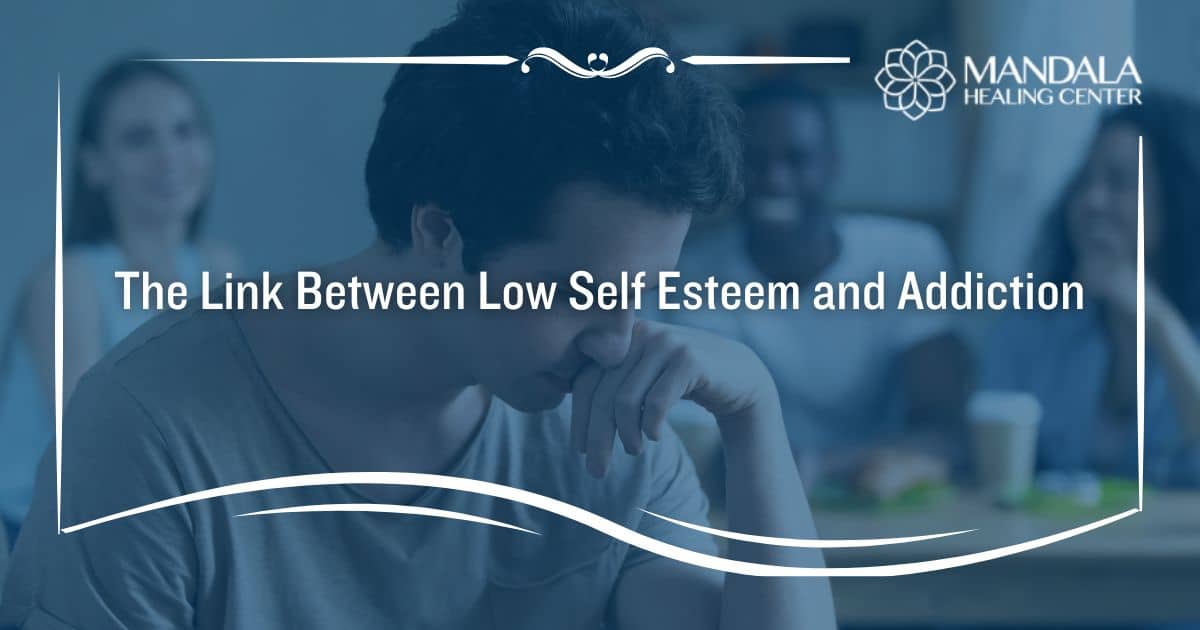Drug and alcohol addictions are complex conditions deeply rooted in a person’s history, genetics, and behaviors. Identifying the underlying causes of addiction can be difficult, but there are some common characteristics that many people with addiction share.
Low self-esteem is common in people with drug and alcohol addiction. While drug and alcohol abuse can lead to serious consequences that impact a person’s self-esteem, many mental health and addiction experts believe low self-esteem can also contribute to substance abuse.
People with addiction require compassionate, personalized treatment to help them discover and treat the root causes of their substance abuse and learn skills to avoid relapse for life. Understanding the complexities of addiction can lead to better, more thoughtful treatment.
Reach out to the caring specialists at the Mandala Healing Center to learn more about our holistic substance abuse treatment programs or to find support during every stage of your recovery.
What Does it Mean to Have Low Self-Esteem?
When we talk about self-esteem, it means your opinion of yourself. Low self-esteem can happen when someone feels worthless, unlovable, incompetent, or inadequate. People with low self-esteem may not like themselves and might assume that no one likes them because they are “damaged” or unworthy of affection.
Having low self-esteem is different than having moments or periods of self-doubt. Everyone feels uncertain, ashamed, or guilty about their behaviors from time to time. But low self-esteem means having a long-term negative view of yourself, your abilities, or your worthiness for love, respect, and acceptance.
How Does Low Self-Esteem Develop?
Experts believe that many factors can contribute to low self-esteem. Many people with chronic low self-esteem live with adverse childhood experiences and trauma, including:
- Neglect
- Physical abuse
- Anger
- Abandonment
- Excessive harsh criticism
- Sexual abuse
- Trouble in school
- Feeling unattractive when compared to social ideals
Childhood experiences can shape how a person feels about themselves, their worthiness of love and affection, and their basic adequacy as a human being. People with low self-esteem often exhibit common traits, including:
- Having a hard time making decisions
- Feeling self-conscious most or all of the time
- Obsessing about their relationships with others
- Feeling defeated if they encounter challenges or setbacks
- Negative self-talk
- Taking the blame for situations outside of their control
- Feelings of shame
- Excessive focus on physical characteristics like height and weight
Low self-esteem can harm people’s health and well-being. People with low self-esteem are more likely to develop anxiety, eating disorders, and depression. They are also more likely to engage in self-harm or have suicidal thoughts and behaviors.
Understanding the Link Between Low Self-Esteem and Addiction
People with low self-esteem often make decisions and behave in ways that support their ideas of low self-worth. Some mental health and addiction experts believe that some people with low-self esteem may abuse substances to dull the pain and stress of their emotions, which can lead to consequences that lower their self-esteem further. Substance abuse can also severely harm your physical and emotional health and addiction.
People who struggle with low self-esteem and addiction may begin using drugs for different reasons. Some of the reasons people with low self-esteem begin to use drugs include:
- To ease the emotional pain of being lonely or unworthy of love
- To fit in with friends
- To disguise feelings of inadequacy
- To feel more comfortable in social settings
- To feel more confident and increase self-worth
Breaking free from the cycle of low self-esteem and addiction can feel nearly impossible. However, getting help for your feelings of self-doubt, worthlessness, or inadequacy and treating your addiction can give you a fresh start in a healthier, more balanced future.
Do I Need Treatment for Low Self-Esteem and Addiction?
The first step in getting treatment for low self-esteem and addiction is to recognize the signs of these conditions. Self-esteem is characterized by feelings of guilt, worthlessness, and self-consciousness, as well as behaviors like being indecisive, apologizing excessively, and giving up easily when faced with setbacks. Individual therapy, group support, and education can help people improve their self-esteem and self-worth to develop a healthier, more fulfilling lifestyle.
Drug and alcohol addiction often changes a person’s behaviors, appearance, and emotions. Some of the signs of addiction include:
- Needing to use more of a substance to get the desired effects
- Having cravings for drugs or alcohol
- Spending a lot of time getting, using, and recovering from using drugs or alcohol
- Engaging in hazardous behaviors while using substances, such as driving, operating machinery, or having risky sex
- Wanting or attempting to stop using substances but feeling like you can’t
- Neglecting your relationships, hobbies, and responsibilities due to your substance use
Comprehensive addiction treatment plans begin with an assessment to identify mental and physical conditions that require attention and treatment. During your treatment program, you will start to explore the roots of both low self-esteem and addiction and learn valuable tools to overcome both.
Get Help Now
If you or someone you love needs help to overcome low self-esteem and addiction, contact the specialists at the Mandala Healing Center today. Explore our holistic addiction treatment programs and find the support, care, and treatment you need to move forward into a healthier, more balanced future.












